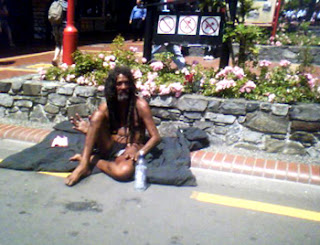A travel journal meets a diary of reflection after both have had a few too many drinks on a rainy Thursday afternoon.
24 December 2006
24 Dec
Funny, Jamie thinks, that so many of the Northern Hemisphere traditions are still held on to in the South Pacific. Take house lights for example. The multi-coloured, flashing spots bordering roof rims and window panes that, in Kansas anyway, are a warm sight in the long, cold nights, are out of place in a country where it's light until 10:00 and sees the sun rise at 5:00. Who besides late night revellers even lays eyes upon them? House lights are just one example of Christmas's place as a winter festival. On the darkest days of winter (for it falls very near the solstice), societies need a celebration to lift their spirits and bring each other physically and mentally closer together. A sort of half way point where a great deal of bother is made over heavy foods, spiced wine, and lots and lots of light. Christmas has surprisingly little to do with Christian tradition. Rather, it has a great deal vested in human bonding.
So why cling to roasts and layered casseroles in a region where it's 90 degrees Fahrenheit on a regular basis? For those in the North, imagine sitting down to baked ham, turkey, hot-cross buns, fruitcake, biscuits, chocolates, and heady red wine in the middle of July. Sorta makes you itch, doesn't it?
Slowly, however, it seems subsequent generations are shuffling off the coils of tradition and setting into motion an altered, more appropriate ceremony. Tradition is rooted in necessity; lose the necessity, and tradition is set afloat. How long it can keep its head above water is anybody's guess.
22 December 2006
21 Dec--Sport
New Zealanders report on rugby and cricket with the same voracity as Americans report on gridiron and baseball. This us understandable as the former, although darkly understood in the States, are popular internationally. However, on the same page one may find articles on cross-country adventure/endurance racing, bicycling (both track racing and the Tour of Southland--New Zealand's answer to the Tour de France), netball, sailing, and numerous foot races (triathalons, mountain runs, etc). For Jamie, reading about sport has never been so enlightening.
20 December 2006
20 Dec--On Revenge

What is revenge? As an emotion it can overshadow everything: fear, rejection, love--all are eclipsed. Revenge sets the mind alight, and all else is consumed. But why do we feel it at all?
Did it once serve a purpose? Was it beneficial? Life abhors wasted energy, and if there is one thing revenge consumes, it's energy. Leading to what? Retaliation. A specific action. Besides abhorring energy, life also tends toward homeostasis, the evenness of things. Revenge is retaliation against dissenters among the group. Revenge drives the body to act, to retaliate against the dissension. Retaliation leads to less dissension, which leads to a calmer group--homeostasis of small societies.
It had a purpose, once. These days it's all but wasted effort. Personal revenge does little more than quench the raw emotion. The greater societal benefits are lost as the boundaries of the proverbial group expand, growing ever wider until revenge itself becomes the norm, and we retaliate only by staying calm.
So can revenge in contemporary societies still be realized? Well, access to the internet helps.
19 December 2006
19 Dec--Take this, JF
 There comes a time in every man's life when he has to stop leaning against the wall when using the urinal, and just pee standing up straight. Many months ago Jamie did just this and was surprised, to put it mildly, to see his sister's name scrawled into the wood. How is it, Jamie thinks, that even when she's a trillion miles away, Libby still manages to win.
There comes a time in every man's life when he has to stop leaning against the wall when using the urinal, and just pee standing up straight. Many months ago Jamie did just this and was surprised, to put it mildly, to see his sister's name scrawled into the wood. How is it, Jamie thinks, that even when she's a trillion miles away, Libby still manages to win.
15 December 2006
15 Dec--On Home

Jamie once referred to home as "what we sacrifice." It made sense at the time--he spent 24 years growing up in Wichita, his family always near. Then one year everyone left. One sister went to Newton, one to Australia (then Canada); one brother moved to California, the other to New Zealand with his parents. Jamie flew to Ireland. And there, in a land of poets, of people so rooted to a place that generations of New Yorkers still call it the homeland, Jamie reflected on what it meant to go home.
There are the obvious cliches: a hung hat, the heart; a place you go where they can't turn you away. There are the traditionalists who, like the Irish or the pagans of ancient Rome, are tied to a region as large as a continent or as particular as one's own neighbourhood. Yet there are only two constants when referring to "home": 1. You know when you are there, and 2. You will, eventually, leave.
The first point is rather vague. It's like determining art from not art. One might describe home as a "sense of belonging," but elaborate--what is a sense of belonging? How does one know when one belongs? And then how does one quantify a sense of this? Furthermore, that sensation is different depending on to whom you're talking. A Congolese refugee may not have the same attitudes toward home as a young girl who suffered abuse there. In both of these cases the individuals were forced to sacrifice their homes--the former being physically removed, and the latter stripped of home's general warmth and comfort before she had a chance to experience it.
But we all leave home--everyone, everywhere--eventually. Whether by force or by choice, we will leave it. Home becomes a sacrifice we share, individually if not collectively. It could be likened to the womb: where we are protected; where we are important. Returning home, be it a physical structure or among a group, is in some way returning to a manifestation of maternal care: like when you were six years old and were scared of the dark, you ran to mother--your first home, your only home.
15 Dec
12 December 2006
12 Dec

Some days you have life cornered. You're eating lunch with friends on a sunny afternoon, sipping beer and watching the world shuffle about. Things are simple. Everything makes sense.
Then a man walks accross the street pushing a pram carrying a dwarf with a ghetto blaster on his lap, and life gives you a reality wedgie--stuff's happening. Wake up.
11 December 2006
11 Dec--FAQs
- What's an agent?
- Is tic-tac-toe solved?
- Why are so few games released for acorns?
- What's this Information Theory thing?
- How many pictures will fit in my memory?
- What should I worry about when buying from a lowest-cost online dealer?
- Where can I get beer?
- What's all this about Cloves?
- What is a troll?
- How and with what do I polish leather?
- How can I protect my ideas?
- I'm new, what should I do now?
08 December 2006
06 December 2006
6 Dec--On bones

They shine at 35, a veritable summer solstice of bone mass. After which point they decline, wither into dusk and the impending winter. Bones are not built to last. And it doesn't help that the very DNA that creates them also breaks them down. Unlike Rilke's angels who "serenely disdain to annihilate us," a chemical in our DNA decimates without hesitation. Year after year, we wear the scars (wrinkles, poor eyesight) as our body slowly eats itself. Without this chemical, however, could bones forever support us?
A forensic anthropologist can identify your age, sex, and (sometimes) your race just by observing signature bones. American Indians carry a unique gene that produces an extra ridge on the tongue-side of some of their teeth; hip bones of adult women are wider and have a more pronounced curve around the ishio pubis. Osteoporosis, polio, bad diet: all can be gleaned from as little as a mandible. If our living faces are televisions broadcasting our interpretation of the world right now, then our bones are time capsules: calcified sponges of facts into which we encode messages--indicators of who we were and how we lived--for the future. Not quite as quick or Wellsian as sending yourself a decade-delayed email, but enough to say "I was an 18-year-old, American Indian woman"; "I survived another trepanning"; "I drank too much Coke." Bones mumble on to whomever listens until, patiently, they turn to stone; their voices reduced: eerie truths whispered among the clamour of flesh. They linger like picture frames sold on the side of the road: the painting gone, the skeleton appears naked and new, catching the light like teeth petrified and smiling.
04 December 2006
4 Dec--On Imagination
One thing is for sure, it would make a good riddle--some stone-toothed whisper from the Sphinx; perhaps chanted in the Oracle's low tones--or a crumb of Zen wisdom dizzying in its circular logic. It makes us human and makes us anything.
In literary circles one finds it dressed up in the guise of Personal Narrative: the stories inside which we frame our existence. We imagine ourselves as forgiving, understanding, attractive. pathetic, thin, fat, tough, happy. We go further and weave a glistening web spun from spools of history, religion, and family. We say, "I am Scottish. We're from the highlands" even when home is America's Great Plains. In this case we are imagining our lives in the context of a whole, where the group in question is family as far down the tree as we can climb with certainty. Understandable when familial links are easily found. More difficult for those orphaned at birth, refugees--those for whom even the concept of home is wholly alien.
Everyone uses it but nobody uses it the same.
In his book The Culture of Make Believe, author Derrick Jensen provides a framework for the notion that Society is little more than a collective imagination, and that the current Western ideals of relationships, crime, and salary expectations are desperately reinforced by other elements of the same culture: television, movies, and print media. As participants in the body, we imagine ourselves fleshing out this skeleton. We emulate the actions of actors and aspire to hang on a model's arm. How we fit ourselves in, on the other hand, is unique to the individual. "Hate" and "love" are spoken freely in reference to a person whom we have never met, and probably never will--except in the context of personal imagination. You hate Julia Roberts. You love Penelope Cruz. You (probably) don't know either, but you can see both women's faces when you read their names. But what about Urmila Matondkar or Mallika Sherawat? As far as you're concerned, they don't exist; and as far as they're concerned, neither do you.
We need it to create our world, but the world would be there without it.
In any given day one can expect the existence of one or more of the following: puppy-shaped clouds, a first kiss, you stole the remote, rainbows, reindeer, Rainer Maria Rilke's Duino Elegies; you can bet somewhere there is some sex, or at least the thought of it. And then earth moves, I remembered the song she used to sing me to sleep, a dream involving cattle, flying pigs, queueing up for tickets, dragons in the kitchen, a hailstorm of heaven-sent scimitars, I'm sure she'll call, I'll never make it, I was there all along, you lied, you never meant it, what did I say?, what is it we were talking about?
Imagine a world without it--a good riddle.

